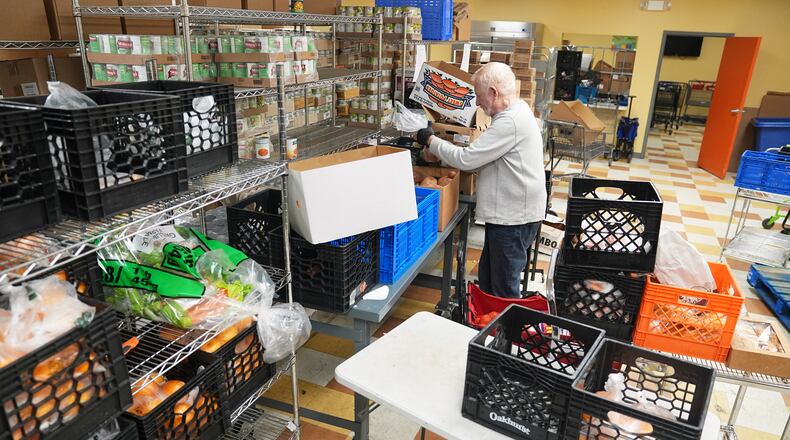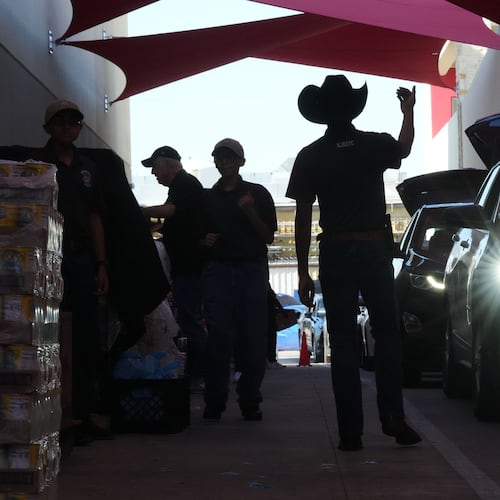President Donald Trump’s administration returned to the Supreme Court on Monday in a push to keep full payments in the SNAP federal food aid program frozen while the government is shut down, even as some families struggled to put food on the table.
The request is the latest in a flurry of legal activity over how the program that helps 42 million Americans buy groceries should proceed during the historic U.S. government shutdown. Lower courts have ruled that the government must keep full payments flowing, and the Supreme Court asked the administration to respond after an appeals court ruled against it again late Sunday.
The high court is expected to rule Tuesday.
Brandi Johnson, 48, of St. Louis, said she’s struggling to make the $20 she has left in her SNAP account stretch. Johnson said she has been skipping meals the past two weeks to make sure her three teenage children have something to eat. She is also helping care for her infant granddaughter, who has food allergies, and her 80-year-old mother.
She said food pantries have offered little help in recent days. Many require patrons to live in a certain ZIP code or are dedicated to helping the elderly first.
“I think about it 24 hours a day, seven days a week, literally,” Johnson said. “Because you’ve got to figure out how you’re going to eat.”
Millions receive aid while others wait
Solicitor General D. John Sauer confirmed that the federal government still wants the lower-court orders put on hold, though in a letter to the justices he also pointed to reports that Congress could soon end the shutdown with a compromise that would fund the Supplemental Nutrition Assistance Program.
Once passed, the government funding package would refill SNAP funds and ensure that states that spent their own funds to keep it running during the shutdown will be reimbursed.
Trump’s administration initially said SNAP benefits would not be available in November because of the shutdown. After some states and nonprofit groups sued, judges in Massachusetts and Rhode Island ruled the administration could not skip November’s benefits entirely.
The administration then said it would use an emergency reserve fund to provide 65% of the maximum monthly benefit. On Thursday, Rhode Island-based U.S. District Judge John J. McConnell said that wasn’t good enough, and ordered full funding for SNAP benefits by Friday.
Some states acted quickly to direct their EBT vendors to disburse full monthly benefits to SNAP recipients. Millions of people in at least a dozen states — all with Democratic governors — received the full amount to buy groceries before Justice Ketanji Brown Jackson put McConnell’s order on hold Friday night, pending further deliberation by an appeals court.
Delays cause complications for some beneficiaries
Millions more people still have not received SNAP payments for November, because their states were waiting on guidance from the U.S. Department of Agriculture, which administers SNAP. Several states have made partial payments, including Texas, where officials said money was going on cards for some beneficiaries Monday.
“Continued delays deepen suffering for children, seniors, and working families, and force nonprofits to shoulder an even heavier burden,” Diane Yentel, President and CEO, National Council of Nonprofits, one of the plaintiffs in the lawsuit, said in a statement Monday. “If basic decency and humanity don’t compel the administration to assure food security for all Americans, then multiple federal court judges finding its actions unlawful must.”
Trump’s administration has argued that the judicial order to provide full benefits violates the Constitution by infringing on the spending power of the legislative and executive branches.
Wisconsin, which was among the first to load full benefits after McConnell’s order, had its federal reimbursement frozen. The state’s SNAP account could be depleted as soon as Monday, leaving no money to reimburse stores that sell food to SNAP recipients, according to a court filing.
New York Attorney General Letitia James said Monday that some cardholders have been turned away by stores concerned that they won’t be reimbursed — something she called to stop.
New Jersey Attorney General Matt Platkin said Trump was fighting “for the right to starve Americans.”
“It’s the most heinous thing I’ve ever seen in public life,” he said.
The latest rulings keep payments on hold, at least for now
States administering SNAP payments continue to face uncertainty over whether they can — and should — provide full monthly benefits during the ongoing legal battles.
The Trump administration over the weekend demanded that states “undo” full benefits that were paid during a one-day window after a federal judge ordered full funding and before a Supreme Court justice paused that order.
A federal appeals court in Boston left the full benefits order in place late Sunday, though the Supreme Court order ensures the government won’t have to pay out for at least 48 hours.
“The record here shows that the government sat on its hands for nearly a month, unprepared to make partial payments, while people who rely on SNAP received no benefits a week into November and counting,” Judge Julie Rikleman of the U.S. 1st Circuit Court of Appeals wrote.
U.S. District Judge Indira Talwani, presiding over a case filed in Boston by Democratic state officials, on Monday paused the USDA's request from Saturday that states “immediately undo any steps taken to issue full SNAP benefits.”
Talwani scheduled a hearing for later Monday on that request.
___
Associated Press writers Scott Bauer in Madison, Wisconsin; Margery Beck in Omaha, Nebraska; John Hanna in Topeka, Kansas; Nicholas Riccardi in Denver; and Stephen Groves and Lindsay Whitehurst in Washington, D.C., contributed to this report.
Keep Reading
The Latest
Featured


